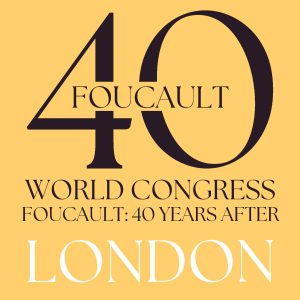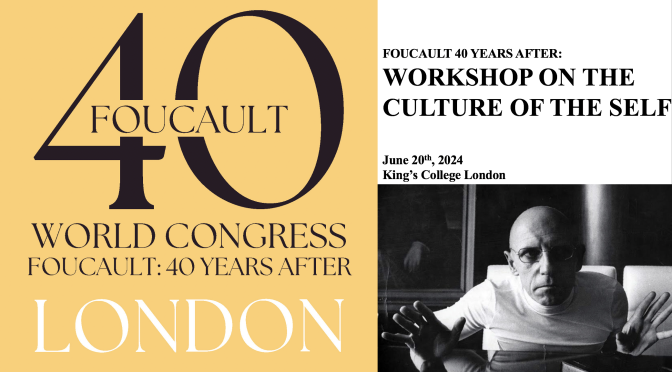By Alexander Giesen
Doctoral researcher Alexander Giesen reflects on the legacy of Michel Foucault 40 years after his death and “The Workshop on the Culture of the Self” as part of the World Congress Foucault: 40 Years After.
“[M]ost of the time, people think that what we must do is disclose, liberate, and excavate the hidden reality of the self. But the self, I think, must be considered not as a reality that might be hidden; I think the self needs to be considered as the correlative of technologies built and developed throughout our history. The problem, then, is not to liberate and “free” the self but to consider how it could be possible to elaborate new types and new kinds of relationship to ourselves.” — Michel Foucault (1983)[1]
“Maybe the problem of the self is not to discover what it is in its positivity, maybe the problem is not to discover a positive self, or the positive foundation of the self. Maybe our problem is now to discover that the self is nothing else than the historical correlation of the technology built in our history. Maybe the problem is to change those technologies. And in this case, one of the main political problems would be nowadays, in the strict sense of the word, the politics of ourselves.” — Michel Foucault (1980)[2]
Yesterday marked the 40th anniversary of the death of French philosopher and historian Michel Foucault (1926-1984), who held the Chair of History of Systems of Thought at the Collège de France. In anticipation of this, I organised a workshop on Foucault’s lecture at the University of California, Berkeley, “The Culture of the Self,” given on April 12th, 1983, a year before his death. The aim of this workshop was to spark insightful conversation on the relevance of Foucault’s late ethico-political work and whether his insights resonate with the challenges and exigencies of the present moment.
Among the participants of the workshop were long-time Foucault scholars Kélina Gotman and Patrick ffrench, master’s students from the Critical Theory MA, and PhD students from the arts and humanities, working on history and philosophy of science, psychoanalysis, literature, and art.
We began the session discussing Foucault’s engagement with Kant and the writings of Greco-Roman antiquity. Foucault presents his audience with a specific Kant, as outlined in previous lectures, “What is Critique” (1978) and “What is Enlightenment?” (1983) or in the introduction to the American translation of Georges Canguilhem’s On the Normal and the Pathological (1978): the Kant of Beantwortung der Frage: Was ist Aufklärung? (An Answer to the Question: What is Enlightenment?).
“Enlightenment is man’s emergence from his self-imposed immaturity. Immaturity is the inability to use one’s understanding without guidance from another. This immaturity is self-imposed when its cause lies not in lack of understanding, but in lack of resolve and courage to use it without guidance from another. Sapere Aude! ‘Have courage to use your own understanding!’ – that is the motto of enlightenment.” — Immanuel Kant, 1784[3]
In “The Culture of the Self,” Foucault suggests Kant introduced a new question into philosophy: ‘the question of the nature, meaning, and philosophical significance of the precise moment when the philosopher is writing and of which he himself is part’ (64-65). Through Kant, we get the questions relating to the late Foucauldian project:
What is our present reality [actualité]? What are we as part of this present reality? What is the aim of our activity of philosophizing insofar as we are part of our present reality? (66)
From here, Foucault is interested in the techniques, or technologies, of the self which have shaped the relations of the self, a theme that dominates the last few volumes of the History of Sexuality. Insert epimeleia heautou and Latin cura sui: the concern or care of oneself.
Reading Kant alongside the Greco-Roman technology of the self-generated the first set of questions. Was Foucault simply interested in two things and tried to make them stick? Or is there real merit in reading the care of self through the historical ontology of the self? What might a future monograph including the Kantian dimension (one Foucault was drafting) have looked like?
We moved quickly to the question of translation, from Ancient Greek and Latin to French to English and possibly back to French. What is lost and gained in the transitions between “epimelia heautou,” “cura sui,” and “the care of the self,” “the concern with oneself”? What difference in meaning is conveyed through the French “le souci de soi” or “s’occuper de soi-même” over “care”, “culture” and “the self”? Can the German “sorge” interject into “care” here? Or is “the self” and its culture tongue-in-cheek, ironic, for the Californian audience?
Towards the end of the workshop, Sammy drew our attention to Foucault’s meditation on kairos after being asked about Lacan’s modern hero “for whom it’s always too early and always too late” (84). Kairos, that is “the right moment”:
“was the play, the element through which human freedom could deal with and manage Ananke, the world’s necessity. That, I think, is the reason why kairos, the problem of the right moment, was one of the central problems in Greek ethics.” (85)
Our discussion moved from the temporalities of sexual acts to the relationality between sexuality and time as opposed to sexual categorization. This opened up wider questions of the timeliness of the thinking and feeling differently that Foucault — like Sylvia Wynter — leads his audience to, as a possible answer to cultures of the self which have been imposed upon the modern subject. Here questions about what future imagined cultures of self might be arose. How does one in the 21st century cultivate the self? How can one undo discipline? What technologies of the self might we develop?

What became clear was that the questions Foucault raised at the end of his life are still potent today. Thus, we aim to develop this workshop into a conference on the theme of the aesthetics of existence, care of self, and technologies of self for the centennial in 2026. If you are interested in participating, please reach out to me at alexander.giesen@kcl.ac.uk.
Acknowledgments: I would like to thank Clara Jones, Ania Stawarka, and the Department of English for funding this event. Thank you also to the International Scientific Committee for the World Congress “Foucault: 40 years after” for supporting this event. A special thanks must be given to Faida Begum who organized the room and catering.
[1] Michel Foucault. [1983] 2024. “The Culture of the Self: Lecture by Michel Foucault at the University of California, Berkeley, on April 12, 1983”. Translated by Clare O’Farrell. In What Is Critique? and The Culture of the Self. Edited by Henri-Paul Fruchaud, Daniele Lorenzini, and Arnold I. Davidson. 63-147. ‘All further references to this edition are given after quotations in the text’
[2] Michel Foucault. 2016. About the Beginning of the Hermeneutics of the Self: Lectures at Dartmouth College, 1980. Edited by Henri-Paul Fruchaud and Daniele Lorenzini Translated by Graham Burchell. Chicago: University of Chicago Press.
[3] Immanuel Kant. 1998. Perpetual Peace and Other Essays. Translation by Ted Humphrey. USA: Hackett Publishing Company. p. 33.
Blog posts on King’s English represent the views of the individual authors and neither those of the English Department, nor of King’s College London.
You may also like to read:

